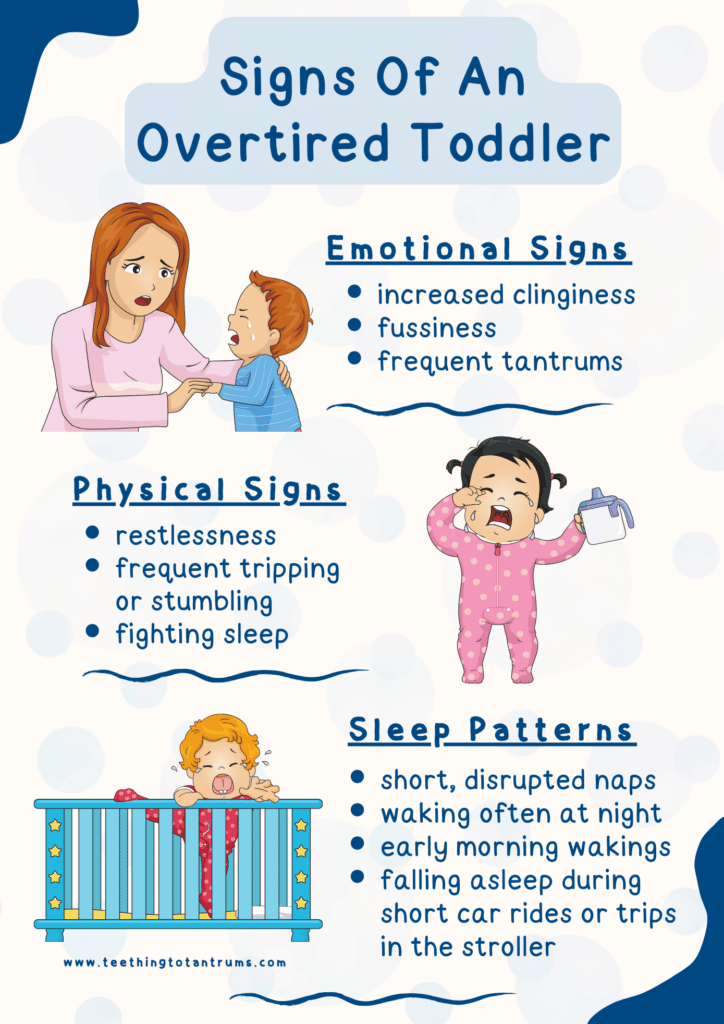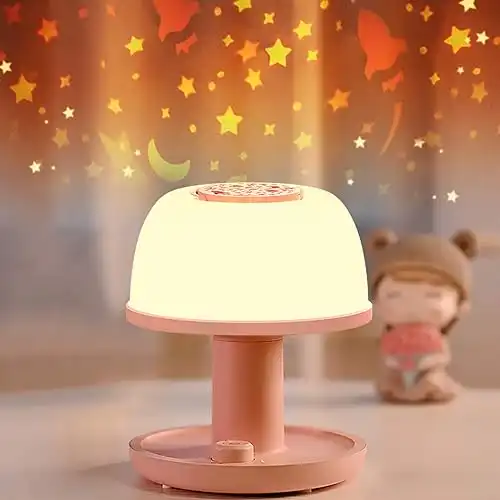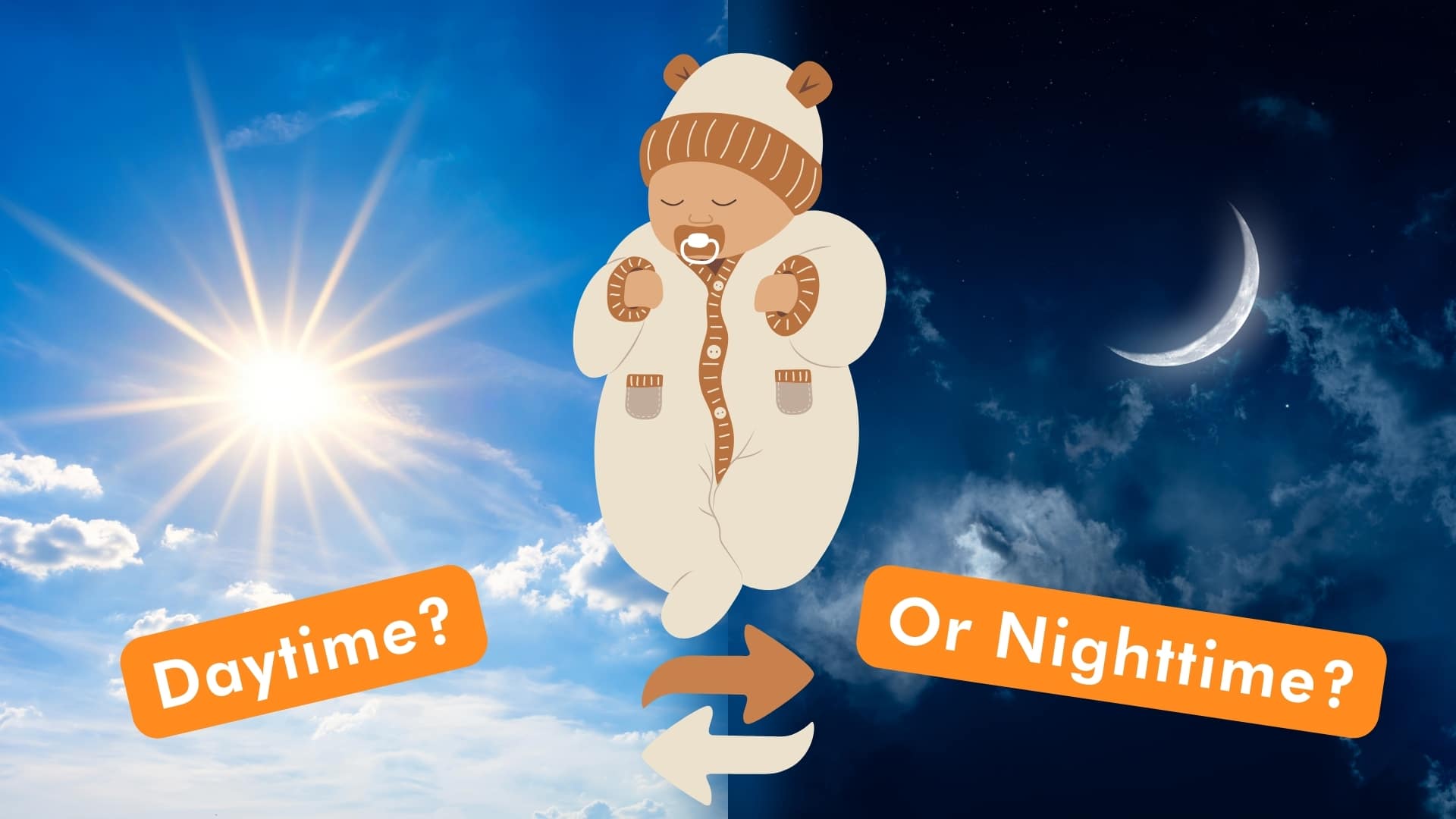If you have read any of my other posts you will know that overtiredness in your little one is the ONE thing that is guaranteed to sabotage your sleep schedule.
And this is never more true than when you’re raising a toddler.
An overtired toddler is not fun to handle and breaking the overtired cycle can be very tricky if not managed correctly.
Fortunately, after 40 years of childcare experience, and helping countless parents break free from the vicious cycle of overtiredness, it’s time to share my knowledge with you.
To help your toddler get the rest they need and end the overtired battles once and for all.

Table of Contents
What Happens When Toddlers Are Overtired?
When managing and appreciating the importance of avoiding overtiredness it helps to understand the chemical processes that occur in your toddler concerning sleep.
If your toddler becomes overtired, their bodies release too much cortisol and adrenaline. Cortisol is a stress hormone and adrenaline is often called the fight or flight hormone.
The release of these extra hormones means that your toddler’s body moves into a heightened state as if it’s dealing with a great danger.
As there is no danger in your toddler’s routine, there is nowhere for the cortisol and adrenaline to go and so there is a build-up of extra energy making it harder for your little one to wind down for sleep.
This results in your toddler becoming hyperactive and fighting you through every step of the pre-sleep routine.
In addition, this buildup of cortisol will mean your toddler will sleep for less time overnight, often waking earlier in the morning than usual.
This then can have a knock-on effect on the next day’s sleep routine and so the overtired cycle continues.
So whilst it can look like a toddler is just being difficult at bedtime… What’s really happening is that they are experiencing intense sleep deprivation and exhaustion.
Looking to get your little one to sleep quickly and effortlessly through a healthy nighttime routine? Check out my Bedtime and Nap Cheat Sheet and master the art of making daytime naps and bedtimes as seamless as possible.
A bedtime & nap cheat sheet so good your little one will ask you to put them to bed...
Laura Williams "This is a life saver! I'm so glad I downloaded your bedtime & nap cheat sheet. My little one actually asked me to put him to bed last night! Unbelievable! Thank you so much!"
Click Here For The FREE Cheat Sheet
7 Overtired Toddler Symptoms
Recognizing the signs of an overtired toddler is key to addressing any sleep issues you may be encountering. So what does an overtired toddler look like?

- An overtired toddler may become clingy and more emotionally reactive than usual and this heightened emotional sensitivity will often lead to increased fussiness.
- While tantrums are more common during the toddler stage anyway, these heightened emotions and mood swings can be exacerbated by a lack of adequate sleep and rest.
- It’s common for an overtired toddler to fight sleep, even when they’re clearly in need of rest. This can be very frustrating as you would assume that if your little one really needs to sleep they would just fall asleep when you put them to bed.
- In an overtired state, your toddler might have a hard time settling down and will instead become hyperactive and restless.
- Once your overtired toddler eventually falls asleep, they are very likely to wake frequently during the night, wake earlier in the morning, or have erratic nap times.
- An overtired toddler may also seem uncoordinated or more prone to tripping and falling due to fatigue. They can experience bouts of dizziness too.
- If your toddler frequently falls asleep on a car ride or in the stroller, it can also be an indicator that they are not getting enough sleep at home in their current sleep schedule.
NOTE: Overtired behaviors can look very similar to behavioral insomnia in childhood (BIC), which includes a lot more delaying tactics, requiring a specific set of conditions and bedtime resistance. If you suspect your child may have BIC, consult a pediatrician for specific advice to manage your toddler’s behavior. Learn more here.
It is important to be attentive to the signs of an overtired toddler so that you can take proactive steps to help them get back on track with their sleep.
But there are two tactics you must implement to manage overtired toddlers.
- Calming down your overtired toddler.
- Getting your overtired toddler to sleep.
You must know how to do BOTH of these things to help break the overtired cycle. Here’s how.

How To Calm An Overtired Toddler
First and foremost creating a calming bedtime routine will establish positive sleep habits and help calm your toddler when they are showing signs of being overtired.
By setting an age-appropriate and consistent sleep schedule, you will help your toddler be prepared for sleep and know it’s time to wind down.
You must also ensure bedtime happens at the same hour every night as it will help stabilize your child’s circadian rhythm.
Secondly, you need to manage your child’s transitions.
I am a great believer in managing transitions to help toddlers move from one part of the day to the next and this is never more important than in the lead-up to bedtime.
Preparation for sleep should begin after the last meal of the day and I always recommend that you focus on screen-free and quiet time activities in the hour before bed.
Engaging in calm play, taking a warm bath then reading a bedtime story, or listening to soft music will all help to relax your child and prepare them for sleep.
Ensure their sleep space is conducive to sleep – dim the lights and remove noisy distractions with the help of a white noise machine, a night light, and black-out blinds.
|
5.0
|
5.0
|
5.0
|
|
White noise machines are a game-changer for your little one's sleep and having one that plays all night is a must. With a long-lasting battery, this compact and stylish white noise machine contains 21 non-stop relaxing noises, which will lull your little one to sleep night after night, no matter where you are! |
Finding the right night light for your child can be quite a task. You want something safe, comforting, and practical. The Cozy Starry Night Light ticks these boxes, with eye-friendly warm lighting and an easy-to-use dimmer. Its gentle glow makes it the best night light for feeding baby, diaper changes, or comforting your little one back to sleep. As your baby grows the Cozy Starry Night Light's starry sky projection can provide comfort and gentle quiet time stimulation. Its soft lighting ensures a dreamy, peaceful environment, supporting your baby’s natural sleep cycle. It really is a fantastic nightlight (at a very reasonable price!) |
Maintaining a good sleep routine with your baby can be tricky, especially through changing seasons or when you’re away from home! This beautiful blackout blind from Tommee Tippee is made from lightweight premium fabric and completely blocks out daylight, helping to create a dark and sleepy space for baby, no matter where you are! |
White noise machines are a game-changer for your little one's sleep and having one that plays all night is a must. With a long-lasting battery, this compact and stylish white noise machine contains 21 non-stop relaxing noises, which will lull your little one to sleep night after night, no matter where you are!
Finding the right night light for your child can be quite a task. You want something safe, comforting, and practical. The Cozy Starry Night Light ticks these boxes, with eye-friendly warm lighting and an easy-to-use dimmer.
Its gentle glow makes it the best night light for feeding baby, diaper changes, or comforting your little one back to sleep.
As your baby grows the Cozy Starry Night Light's starry sky projection can provide comfort and gentle quiet time stimulation. Its soft lighting ensures a dreamy, peaceful environment, supporting your baby’s natural sleep cycle.
It really is a fantastic nightlight (at a very reasonable price!)
Maintaining a good sleep routine with your baby can be tricky, especially through changing seasons or when you’re away from home! This beautiful blackout blind from Tommee Tippee is made from lightweight premium fabric and completely blocks out daylight, helping to create a dark and sleepy space for baby, no matter where you are!
All of these actions will signal that it’s time to transition from playtime to sleep. You can try introducing a comfort object (a blanket or a stuffed animal) that your toddler associates with sleep to provide a sense of security, making bedtime less challenging.
A warm bath is also a bedtime routine essential that can soothe an overtired toddler.
The warm water can relax their muscles and ease them into a state ready for sleep. After the bath, dress your toddler in comfortable pajamas.
Finally, incorporate nature as a calming influence if possible. A window view of the stars, hearing owls hoot, or the sound of the wind can all be soothing to a stressed-out toddler.
Getting out in the fresh air during the day also contributes to better sleep at night. It balances melatonin levels and allows toddlers to get some all-important physical exercise, both of which will improve your toddler’s sleep.
If this is not possible, even fake plants in a bedroom can help relax children.
NOTE: Having a bath every night is not so much about getting clean (unless your toddler is really muddy!), but more about having a consistent and relaxing end of the day.
How To Get An Overtired Toddler To Sleep
Without sounding like a broken record, establishing a consistent bedtime and nap routine truly is key for your toddler’s sleep habits and this is never more important than if they are overtired. This is because a calming sequence of activities signals to their body it’s time for rest.
If you have an overtired toddler you will have more of a challenge to calm them down and settle them to sleep. However, this is when you must be your most consistent.
- Having a sleep and nap routine that your toddler recognizes can often soothe them when they are feeling all over the place due to being overtired.
- Warm baths and quieter activities like reading a book or listening to soft music all help to release melatonin, the sleep hormone, resulting in your toddler feeling calmer and more ready to sleep.
- Don’t delay bedtime: It is important not to fall into the trap of thinking that if you keep your toddler up they will be more compliant at bedtime. It will only backfire on you. Remember, you can always wake your little one up from a quick afternoon nap so it doesn’t interfere with their bedtime.
- Consider an earlier bedtime: Overtiredness will not be your friend when it comes to settling your toddler. However, an earlier bedtime is more likely to help the evening routine run more smoothly. Start by bringing bedtime back by 10-15 minutes every night.
- Watch for sleep cues: Aim to recognize the first signs of sleepiness to avoid your toddler falling into an overstimulated state. Common sleep cues include yawning, stretching, eye-rubbing, whining, and refusing to participate in activities.
- Slow down and avoid screens: Make the end of the day a calming experience with dim lights and reduced noise as the evening progresses. Your toddler must also avoid screens and loud toys at least an hour before bed, as they will hinder your toddler’s ability to fall asleep.
- Ensure that afternoon naps do not last too long and wake them if necessary. Naps are important for toddlers, but they shouldn’t be too long or too late in the day. If your toddler had a long morning nap you may wish to shorten the later nap or vice versa. During nap transitions you may need to let them have 1 nap on some days and 2 on others. Nap transitions can easily lead to overtiredness so take a look at our post on this tricky phase to help you avoid this happening.
- On top of this, you will need to keep calm and have lots of patience. The truth is feeling overtired is not a pleasant experience for a toddler and they will need all your help to get their sleep cycle re-settled. If you start escalating, the issue will only get worse.
It is important to know the difference between overtiredness and other bedtime battles. You can eliminate the confusion by ensuring your toddler is no longer overtired and then you can address any other issues with a clear conscience.
NOTE: If you have established a routine and your toddler is not overtired but challenges persist, consider sleep training methods that are gentle and appropriate for your toddler’s age. Addressing sleep issues is not a one-size-fits-all situation, so be prepared to adapt the sleep training plan to your child’s unique needs.

Is Your Toddler Overtired Or Under-Tired?
Sadly, this is a question I do not see addressed by many parenting sites, but it’s an important one to ask…
After all, recognizing whether your toddler is overtired or under-tired is vital for their well-being and allows you to know how best to deal with any sleep issues.
An overtired toddler may be irritable, overly emotional, and have trouble sleeping.
When sleep is insufficient, sleepiness can hit hard and fast for toddlers so if you do not react swiftly you can find yourself having to deal with a hyperactive child that is very difficult to handle.
However, an under-tired child will also display too much energy close to bedtime and have difficulty settling down for a nap.
The main difference between an overtired toddler and an under-tired toddler is that an under-tired toddler will be less fussy, clingy, or emotional and will not spiral into a meltdown as time passes.
TOP TIP: It is OK to wake your toddler from a daytime nap to ensure they are ready for bedtime when it comes around. Having the right amount of daytime sleep will help with both overtiredness and under-tiredness. A toddler needs between 11 and 14 hours of sleep (which includes naps) every 24 hours.
Here are the top signs and differences between overtiredness and under-tiredness that you may see in your toddler.
Signs of Overtiredness:
- Increased clumsiness
- Tantrums or heightened sensitivity
- Resistance to bedtime
- Clinginess and fussiness
- Hyperactivity
Signs of Under-Tiredness:
- Less interest in naps
- Difficulty falling asleep at night
- Excess energy when it’s time to rest.
To avoid overtiredness and under-tiredness, aim for a restful routine and an age-appropriate sleep schedule to help manage your toddler’s sleep cycles.
If your toddler is regularly experiencing a lack of sleep and becoming overtired chances are you will need to make some adjustments to their sleep schedule.
Keep a close eye on their behavior and match their sleep times to when they naturally seem tired. Don’t try to fit your toddler into ‘the schedule’ rather build ‘the schedule’ around them.
Planning, consistency, and paying close attention to your toddler’s sleep cues can help ensure your toddler gets the sleep they need.
REMEMBER: If your toddler appears to be consistently overtired despite all your best efforts consult your pediatrician or sleep consultant to rule out any underlying causes and for tailored advice. Here are some causes of tiredness in children that are not always obvious.
Frequently Asked Questions About Overtired Toddlers
In this section, I address common concerns you might have about your toddler’s sleep issues and provide practical tips.
Q: How common are toddler sleep issues?
A: Unfortunately, sleep issues are incredibly common in young children, with estimates ranging from 25% to 46% in the infancy and preschool years. The most common sleep problems in childhood include short sleep duration, delayed sleep onset, poor sleep quality, and nighttime awakenings (Hartzinger et al., 2008).
Q: Do toddlers sleep worse when they’re overtired?
A: Yes, when your toddler becomes overtired, they often have a harder time falling asleep. Despite being very tired, they will resist sleep and wake early leading to frustration for both you and your child. This sleep deprivation can then cause a cycle where it makes it even more difficult for toddlers to fall asleep at the next bedtime or naptime.
Q: Can a lack of napping contribute to toddler sleep issues?
A: Yes, insufficient napping can lead to sleep issues in toddlers. A lack of naps can make your toddler more restless and hinder their ability to sleep through the night. Try to establish a consistent nap schedule that suits your child’s needs and watch for signs of sleepiness to prevent overtiredness.
Q: What strategies can help a toddler who wakes up frequently during the night?
A: To help your toddler who wakes often, maintain a regular bedtime and nap routine that is calming and familiar. Get outside every day in the natural light and fresh air. Ensure the sleeping environment is conducive to sleep, with a comfortable bed and a room that is dark and quiet, and avoid stimulating activities and screens before bedtime. If your toddler wakes up, provide reassurance with a gentle pat or a soft lullaby.
Q: Why does my toddler wake up crying and how can I address it?
A: Toddlers may wake up crying due to discomfort, nightmares, or transitions in sleep cycles. To address this, respond to their cries calmly and soothingly, checking for any immediate needs like a diaper change or thirst. Comfort them without picking them up from the crib, if possible, to help them learn to self-soothe and fall back asleep.
Q: Does being overtired affect a toddler’s overall sleep quality?
A: Yes. Being overtired certainly affects a toddler’s sleep quality. It can result in difficulty falling asleep, and more frequent night wakings. Also, it can lead to early morning awakenings.
Need More Parenting Help?
- Download our FREE Bedtime & Nap Sleep Cheat Sheet. It’s a free, easy-to-use and proven formula designed for parents of 0-5 year olds to master the art of consistently undisturbed and restful sleep without the yelling, nagging or exhausting long-winded evenings.
- Check out our Parenting Toolbox. You’ll get access to expertly-chosen products that you can guarantee are the best for your little one and your wallet.
- Are you looking for personalized guidance to navigate the challenges of parenting? I offer 1-on-1 consultations to bring you tailored strategies and actionable advice to help support your child's growth and well-being with confidence.

A bedtime & nap cheat sheet so good your little one will ask you to put them to bed...
Laura Williams "This is a life saver! I'm so glad I downloaded your bedtime & nap cheat sheet. My little one actually asked me to put him to bed last night! Unbelievable! Thank you so much!"
Click Here For The FREE Cheat Sheet





